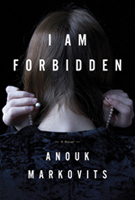
ISBN: 978-0-307-98473-9
A Reader's Guide for I Am Forbidden
Guide written by Amy Clements for the Hogarth U.S. paperback edition
Click here for printable version>>
Bringing to life dilemmas of love versus law, tradition versus modernity, individual versus community, I Am Forbidden will spark inspiring dialogues in your reading group. We hope that this guide will enhance your discussion.
Questions and Topics for Discussion
1. The opening scene powerfully illustrates Jewish ultra-Orthodox teachings regarding the struggle between body and soul. What is the nature of Zalman's sin? What does this scene tell us about the yearning for holiness depicted throughout the book?
2. After Florina rescues Josef, what do she and Josef learn from each other? Which aspects of Josef remain within Anghel in Book I, and which aspects of Anghel remain within Josef later in life?
3. Discuss the "I" in the title. Which character or characters do you think it most refers to?
4. What accounts for the different paths Atara and Mila take, despite being steeped in the same teachings? Where, in the text, do you see them begin to diverge? How would you interpret these lines:
"She [Atara] synched her steps to those of strangers so that they would take her to different fates. The postman on his bicycle, she envied him, envied his wheels kissing the cobbles, that he knew one language only, one country only, envied his undivided past, undivided from his future." (p. 122)
"Atara flew above river and roofs, above all the boundaries the world drew around her. Mila whirled faster still, until she let herself drop to the ground, too dizzy to answer Atara's calls. When Mila's eyes opened, they were filled, not with Atara's inebriation but with apology—for surviving, for being alive. Atara combed her fingers through Mila's disheveled hair, combed them toward what she hoped might still be the direction of an escape." (p. 138)
5. A turning point in Atara's life is the discovery of the Kastner Affair. How did you react to Joel Teitelbaum, the Rebbe of Satmar, boarding Kastner's train? How would you approach the complex ethical dilemmas reflected in this debate? Was Teitelbaum working from a different concept of leadership than the one that says that a captain must stay on his sinking ship until his passengers are safe?
6. The physical appearance of the Satmar sets them apart from mainstream culture and helps them to preserve their identity. Has your family been able to preserve its cultural and religious heritage, or has it assimilated? Do you think it is constructive to give up characteristics of one's heritage in order to accept shared values and belong to a more universal society?
7. In tender scenes, the author balances the beauty and the constraints of the Satmar world. Which aspects of this world were the most intriguing to you? Which aspects defied stereotypes?
8. Devotion thrives in the novel's arranged marriages. How would you fare in such a marriage, particularly one with strict protocols regarding sex and pregnancy?
9. Is Mila and Josef's pursuit of a pure bloodline commendable or destructive, in light of their losses?
10. How do the scenes in Paris present the experience of exile?
11. Mila and Josef grapple with the conflict between modern medicine and ancient texts. What choices would you have made in their situation?
12. Judith's and Josef's stories embody the belief in a biblical command that asks that descendants be held liable for the sins of their ancestors. What do you think of this belief? Would their dilemmas have been different if women served on rabbinic courts of law?
13. How does the Satmar belief system compare to that of other fundamentalist faiths? How does the experience of reading about it through fiction—immersed in a novelist's storytelling— enhance your understanding?
14. Zalman, Josef, Mila, Atara, and Judith take turns as the primary character from whose perspective the story is told. What is the effect of these shifting points of view and why do you think the author chose that approach?
15. Who is stronger: Atara, living independently, or Mila, seeking strength through community?
16. Do you have siblings or family members from whom you are estranged? What did this novel make you think about estranged relationships and about family bonds in general?